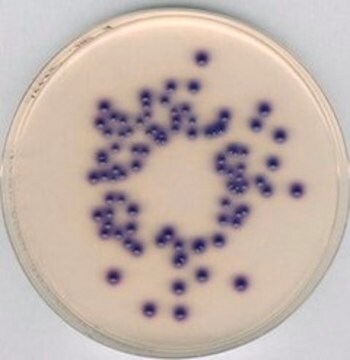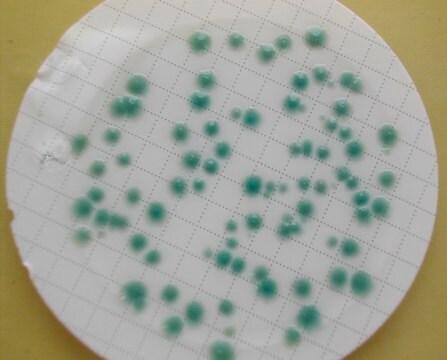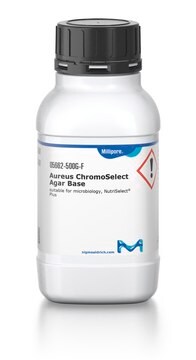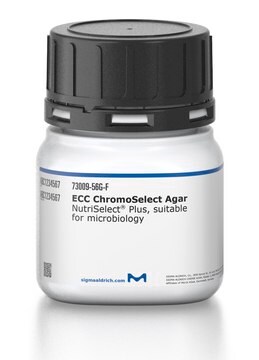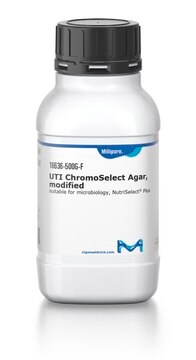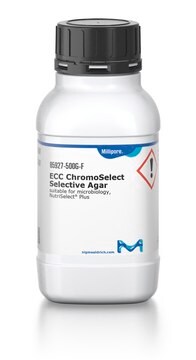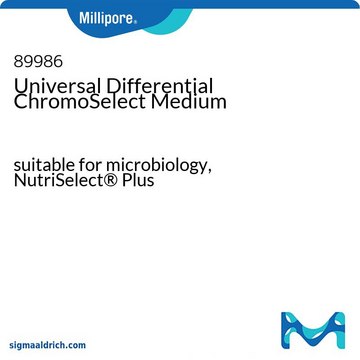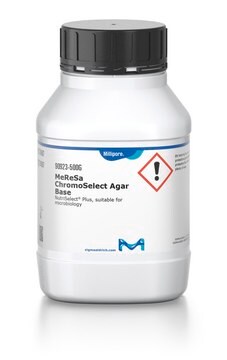00563
MM ChromoSelect Agar
NutriSelect® Plus, suitable for microbiology
Sinónimos:
ChromoSelect Miller and Mallinson Agar, MM Agar ChromoSelect
About This Item
Productos recomendados
form
powder
Quality Level
shelf life
limited shelf life, expiry date on the label
composition
agar, 15.0 g/L
D-cellobiose, 3.0 g/L
chromogenic mixture, 6.6 g/L
lactose, 10.0 g/L
D-mannitol, 1.2 g/L
peptone (vegetable), 10.0 g/L
D-trehalose, 1.33 g/L
vegetable extract, 2.0 g/L
manufacturer/tradename
NutriSelect® Plus
final pH
7.6±0.2 (25 °C)
application(s)
clinical testing
environmental
food and beverages
pathogen testing
microbiology
storage temp.
15-25°C
suitability
nonselective and differential for Citrobacter spp.
nonselective and differential for Escherichia coli
nonselective and differential for Salmonella spp.
nonselective and differential for coliforms
nonselective and differential for enterobacteriaceae
Application
Preparation Note
Footnote
The designations basic, plus, or prime are added to indicate the quality control level, from basic quality control to standard QC plus to prime for full regulatory compliance.
Legal Information
Storage Class
11 - Combustible Solids
wgk_germany
WGK 3
ppe
Eyeshields, Gloves, type N95 (US)
Elija entre una de las versiones más recientes:
Certificados de análisis (COA)
¿No ve la versión correcta?
Si necesita una versión concreta, puede buscar un certificado específico por el número de lote.
¿Ya tiene este producto?
Encuentre la documentación para los productos que ha comprado recientemente en la Biblioteca de documentos.
Los clientes también vieron
Artículos
Salmonella contamination is the second leading cause of food-borne illness worldwide. Controlling outbreaks of Salmonella is an important task for food regulators, restaurants and the food industry in general. The Salmonella family includes over 2,300 serotypes of bacteria, but two types, Salmonella enteritidis and Salmonella typhimurium, are responsible for about half of all human infections. Most outbreaks of Salmonella are traced back to dairy, poultry and meat products, but Salmonella can grow on nearly any food. Chicken, eggs and their derivative products are particularly high risk.
Nuestro equipo de científicos tiene experiencia en todas las áreas de investigación: Ciencias de la vida, Ciencia de los materiales, Síntesis química, Cromatografía, Analítica y muchas otras.
Póngase en contacto con el Servicio técnico